Floating Production – A Growing Segment in Transition
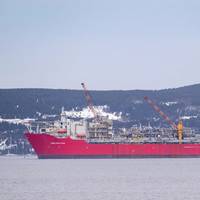
The specialized deepwater oil & gas and floating offshore wind segments will share many of the same stakeholders and supply chains, competing for increasingly scarce resources.To receive a full version of Inteletus analysis, click hereThe established floating production segment is forecast to experience continued growth through this decade, driving demand for, among other things, moorings, subsea systems, umbilicals, risers, flowlines and the large anchor handlers and subsea support vessels that will install and maintain the elements.At the same time…
BOEM and NOAA Release North Atlantic Right Whale and Offshore Wind Strategy
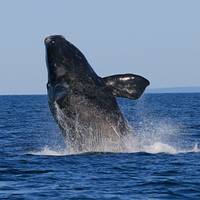
The US Bureau of Ocean Energy Management (BOEM) and the National Oceanic and Atmospheric Administration (NOAA) Fisheries have released a final joint strategy to protect and promote the recovery of endangered North Atlantic right whales while responsibly developing offshore wind energy.The strategy builds on existing mitigation measures to protect North Atlantic right whales from the potential impacts of offshore wind development and was developed to support the Biden-Harris administration's goal of deploying 30GW of offshore wind by 2030.North Atlantic right whales are approaching extinction.
Sails and Satellite Navigation Could Cut Shipping Industry’s Emissions By Up to a Third
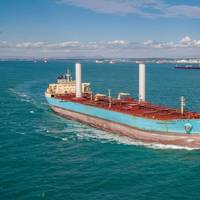
In the vast expanse of the world’s oceans, a transformation is underway.The international shipping sector, made up of thousands of massive cargo ships laden with many of the goods we buy, emits carbon dioxide (CO₂) roughly equivalent to the entire country of Germany.Our research emphasises the need for immediate action. Reducing shipping emissions by 34% by 2030 is necessary to stay on course with the Paris Agreement’s 1.5°C goal. But with low-carbon fuel pipelines unlikely to be available at the necessary scale until at least the 2030s…
Study Calls for 'Liberation of Data' in Shipping Shift for Decarbonization
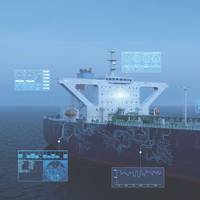
Siloed data systems represent a “recipe for duplicative and multiplicative cost inside a company and across companies”, an OrbitMI-hosted panel at the recent Shipping Insight event in the US was told, as a Bureau Veritas-backed study highlighted this as a big barrier to data collaboration for digitalization of shipping to cut emissions.Vast amounts of data are generated from ship operations - such as from sensors onboard or vessel performance management systems - as well as from…
Report: CCS Unlikely to Constrain Blue Ammonia Availability
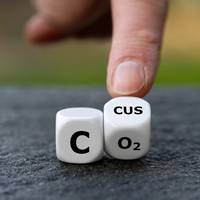
The Mærsk Mc-Kinney Møller Center for Zero Carbon Shipping has released a report indicating that CO2 storage capacity is unlikely to constrain the availability of blue ammonia for shipping by 2030.The report analyzed whether potential carbon storage in carbon capture and storage (CCS) networks can meet the expected demands from blue ammonia production for maritime in the context of the wider demand for CCS from other industries.It also evaluated potential constraints on CCS and blue ammonia availability…
Berge Bulk, ABS Examine Methanol Refit for Bulk Carrier
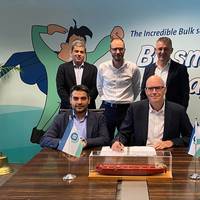
A Joint Development Project (JDP) to evaluate the feasibility of converting a bulk vessel to methanol fuel propulsion was signed by Berge Bulk CEO James Marshall and ABS Vice President of Global Sustainability Panos Koutsourakis.Per the agreement, the team will examine the possibility of retrofitting the 300-m, 210,000-dwt heavy fuel oil propelled bulk carrier Berge Mauna Kea to operate on methanol fuel. The six-month study is already underway.“Retrofitting alternative fuel capability to the global fleet is going to be critical if we are to achieve our sustainability goals.
Wilson Taps Seaber to Digitalize Fleet Scheduling
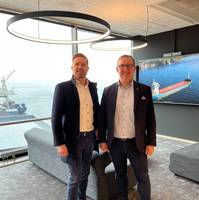
Finnish maritime software company Seaber.io announced Norway-based Wilson EuroCarriers will use its technology to enable the digitalization of its fleet scheduling, helping to improve efficiency as well as reducing costs and emissions.With a fleet of about 130 vessels in the range of 1500-8500 DWT, Wilson is the largest short sea shipping company in Europe. As a fully integrated shipping company Wilson handle everything in-house, chartering and operations, ship management, marine accounting…
Berge Bulk, Kongsberg Maritime Ink MoU on Decarb Tech
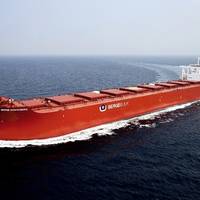
Kongsberg Maritime (KM) and dry bulk owner Berge Bulk signed memorandum of understanding to jointly develop and advance the deployment of decarbonization technologies onboard dry bulk cargo vessels.Berge Bulk aims to be carbon-neutral by 2025, and to have a zero-carbon ocean-going dry bulk carrier by 2030. There are two elements of the joint development project. The first will be to evaluate and test emerging decarbonization technologies for use in the maritime sector. The second…
Academia’s Climate Change Challenge is Far from Academic
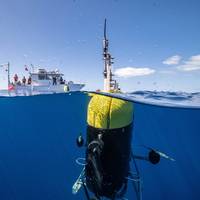
Highlighted in Marine Technology Reporter's MTR100 is the work and technology ongoing in the halls of academia. The most recent report released by the UN Intergovernmental Panel on Climate Change emphasized our warming planet, an expected announcement for many in the scientific community. Faced with the confirmation that human activities have caused an increase in global temperatures, research has turned to seeking answers in the planet’s natural systems. How does each part of the global carbon cycle work and how may it be impacted by the changing climate?
Video: RoRo Ship to be Fitted with Tilting Rotor Sails
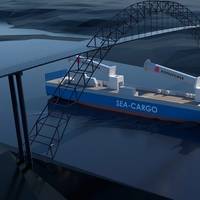
A RoRo cargo ship operating in the North Sea will be fitted with two of Norsepower’s largest Rotor Sails, reducing the vessel's total emissions by as much as 25%. The Rotor Sail is essentially a modernized version of the Flettner rotor, a rotating cylinder that uses the Magnus effect to harness wind power to thrust a ship, taking some of the load off of the ship's main engines and therefore reducing fuel usage and emissions.At 35 meters tall and five meters wide, the Rotor Sails…
Van Oord, Hendrik in Lifting Equipment Deal
Dutch maritime contracting company Van Oord is partnering with compatriot company Hendrik Veder Group for the management of heavy lifting equipment for offshore wind turbines.Rotterdam-based company active in steel wire and fibre rope products and services said that under the terms of the two-year agreement, Van Oord will outsource its hoisting and lifting equipment management to the Hendrik Veder Group, with a focus on sustainable lifting.According to Michiel Pieterman, Offshore Wind Operations Manager at Van Oord: "This partnership enables us to use lifting equipment in a sustainable way. The high-quality lifting equipment has a longer lifespan, because it is either reused or converted into new raw materials, while guaranteeing 100 percent compliance at all times.
CIMAC Calls for Cross-sector Cooperation to Reduce Pollution
The IMO decision of April 2018, calling the international shipping industry to decarbonize and at least halve its greenhouse gas emissions by 2050 was an important milestone and was largely welcomed by the global engine builders’ community. Although some parties found that the IMO target could have been even more ambitious, it clearly marked a paradigm shift: improvements in existing technologies will not be enough. Only through cross-sector cooperation and an increased focus on R&D in carbon-neutral technologies (such as batteries, fuel cells, or synthetic fuels) will shipping stand a chance of reaching the IMO 2050 target.2050 – The day after tomorrow2050 may sound distant, but for the shipping community it is not.
Oil and Gas Demand to Peak in 2023 and 2034: DNV GL
The oil and gas demand will peak in 2023 and 2034, respectively, according to DNV GL’s 2018 Energy Transition Outlook, an independent forecast of the world energy mix in the lead-up to 2050However, new oil fields will be needed until at least the 2040s, while new gas developments will be required beyond 2050. DNV GL’s Outlook predicts that operators will favour production from a greater number of smaller reservoirs with shorter lifespans, lower break-even costs and reduced social impact compared to those currently in operation.“Most easy-to-produce, ‘elephant’ oil and gas fields have been found and are already in production. Smaller reservoirs will likely be harder to explore and develop commercially.
Partners Launch Zero Emissions Ferry Project
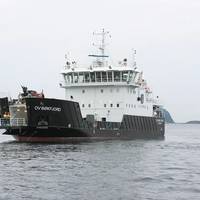
By combining existing technologies in a new way, it is possible to build ferries that represent a quantum leap for the environment. That is the idea behind a new R&D project involving four major players in the maritime sector: Rolls-Royce, Color Line, Norled and the Norwegian Coastal Administration. The project has now received a NOK 5.9 million grant from the Research Council of Norway’s ENERGIX program. The ‘Zero Emission Ferry’ project is intended to result in a new electrical system that not only provides more efficient power output and stable operations…
Veson Nautical Solution Earns EU’s MRV Certification
Commercial maritime software and services provider Veson Nautical announced that Verifavia, the emissions verification company for the aviation and shipping sectors, officially certified its Veslink Voyage Reporting system as a solution for the European Union’s (EU) upcoming Monitoring, Reporting, and Verification (MRV) regulation. Veslink Voyage Reporting streamlines data collection and distribution from vessels, operators, agents and counterparties, and is used by more than 100 of the top shipping organizations worldwide, managing over 5,000 vessels. Verifavia Shipping, a fully-accredited global EU MRV Verifier by the United Kingdom Accreditation Service (UKAS) and the French Accreditation Body (COFRAC)…
LNG COGES-powered 20,000 TEU Ship Closer to Reality
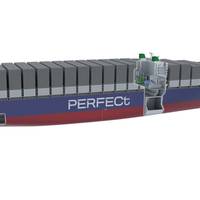
A joint industry project (JIP) examining the potential of developing an electric-driven 20,000 TEU ultra large container vessel (ULCV) with an LNG-fuelled combined cycle gas and steam turbine (COGES) electric power plant aims to utilize LNG as a primary fuel for an ultra-low emissions profile, in a design with at least the same carrying capacity and efficiency as existing ULCVs. At the Nor-Shipping trade fair in Oslo, the PERFECt project partners ABB, OMT, GTT, Caterpillar’s Solar Turbines…
Caribbean Centre Launches on Low-Carbon Shipping Mission
A new centre tasked with promoting technologies and operations to help navigate shipping into a low-carbon future has been launched at the University of Trinidad and Tobago (8 March). The centre will cater to the needs of the Caribbean region under the Global Maritime Technology Cooperation Centre Network (GMN) – a project funded by the European Union (EU) and run by International Maritime Organization (IMO). The GMN initiative unites carefully selected technology centres into a global network focused on supporting developing countries in activities including development of national energy-efficiency policies for their maritime sectors.
New Plan Pledges Ferry Safety Lead
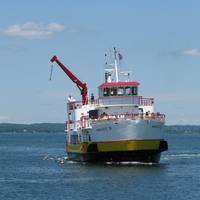
Interferry has unveiled a strategic plan promising to put safety issues at the heart of its work as the voice of the worldwide ferry industry. The pledge came at the global trade association’s 41st annual conference in Manila – a venue chosen to spotlight the challenges of domestic ferry safety in developing nations. According to Interferry, the plan signals its overriding ambition to help lift ferry safety in all parts of the world to the very high standard already in place in North America and Europe, where casualties in recent decades have been extremely rare.
Voith Linear Jet Offers Fuel Savings

Crew transfer vessel operators using the new Voith Linear Jet (VLJ) marine propulsion system can save over £75,000 in fuel costs in a season, the manufacturer claims. The cost saving, around 20 percent, is a key figure from the collection of extensive data from four months’ operation in a range of sea conditions, working at different speeds and with different loadings. The Voith Linear Jet, unveiled last year as a “world first” in marine propulsion technology, combines elements of two existing technologies: conventional screw propellers and water jets.
Coast Guard, Homeland Security Open Joint R&D Facility
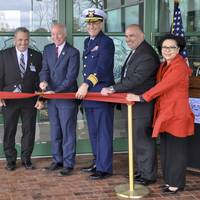
The Coast Guard Research and Development Center, in conjunction with the Department of Homeland Security, officially opened a joint research facility in a ribbon-cutting ceremony at the R&D Center’s offices located at Fort Trumbull. The Science and Technology Innovation Center is a collaborative effort between DHS Science and Technology and the Coast Guard R&D Center dedicated to leveraging innovation, prototyping and rapid integration of high technology solutions to answer the operational challenges of the Coast Guard and DHS.
Carbon War Room Launches Shipping Efficiency Advisory Board
Six leaders and influencers from across the shipping industry will join global NGO Carbon War Room’s (CWR’s) Shipping Operation Advisory Board. Their backgrounds span the shipowning, chartering, technical analysis, finance, and academic worlds. The board will lend extensive industry insight and support CWR’s mission to profitably decarbonise the international shipping industry. Galen Hon, Manager, Shipping Operation, Carbon War Room, commented: "Following UNFCCC in Paris, the industry has an obligation to find new and innovative ways to reduce carbon while remaining competitive. With expertise spanning finance, ship operation, classification, data analysis, technology, and software, these individuals are perfectly positioned to identify and evaluate opportunities for innovation and growth.
CWR Launches Shipping Efficiency Advisory Board
Six leaders and influencers from across the shipping industry will join global NGO Carbon War Room’s (CWR’s) Shipping Operation Advisory Board. Their backgrounds span the shipowning, chartering, technical analysis, finance, and academic worlds. The board will lend extensive industry insight and support CWR’s mission to profitably decarbonise the international shipping industry. Galen Hon, Manager, Shipping Operation, Carbon War Room, commented: "We are thrilled to have gathered a group with so much knowledge and experience in shipping. Following UNFCCC in Paris, the industry has an obligation to find new and innovative ways to reduce carbon while remaining competitive.
Reducing Emissions From the Shipping Sector
The EU is calling for a global approach to reducing greenhouse gas emissions from international shipping – a large and growing source of emissions. As a first step, large ships using EU ports will be from 2018 required to report their verified annual emissions and other relevant information. Maritime transport emits around 1000 million tonnes of CO2 annually and is responsible for about 2.5% of global greenhouse gas emissions. Shipping emissions are predicted to increase between 50% and 250% by 2050 – depending on future economic and energy developments. This is not compatible with the internationally agreed goal of keeping global temperature increase to below 2°C compared to pre-industrial levels, which requires worldwide emissions to be at least halved from 1990 levels by 2050.





